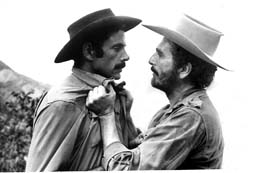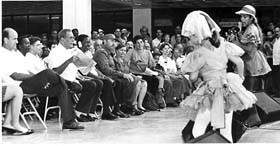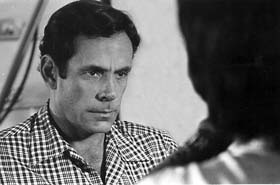
March 1, 2008
See the full-page print edition of this
story in the original Spanish:
http://www.walterlippmann.com/granma-03-01-2008-sergio-corrieri.pdf
Sergio Corrieri: Art for the
Revolution
A legend in the Cuban cultural world and president of the Cuban Friendship Institute (ICAP), Sergio Corrieri, died in Havana Friday at the age of 69. His ashes will be on display Saturday from 9:00 a.m. to 4:00 p.m. at the funeral parlor at Calzada and K in the Vedado District. velar
PEDRO DE LA HOZ
pedro.hg@granma.cip.cu
A modest man by virtue, totally committed to the fate of his country, a defender of socialist values and loyal to the historic leadership of the revolution, Corrieri never stopped working for his convictions and always gave his best to the tasks asked of him.
 MEMORABLE
PERFORMANCE OF CORRIERI
MEMORABLE
PERFORMANCE OF CORRIERI
IN THE FILM EL HOMBRE DE MAISINICU.
Born in Havana on March 2, 1938, Corrieri leaves behind a legacy in the performing arts. Tomorrow he would have turned 70. Attracted to acting, he enrolled at the University Theater and debuted at sixteen in the play El nieto de Dios, by Joracy Camargo of Brazil.
Corrieri was a founder of the Teatro Estudio group along with Raquel and Vicente Revuelta and was on stage during the premiere performance of Eugene O’Neill’s Long Day's Journey into Night.
 AT
THE HEAD OF ICAP, CORRIERI CARRIED OUT AN INTENSE AND COMMENDABLE
EFFORT. IN THIS PHOTO HE JOINS FIDEL CASTRO IN ONE OF THE ACTIVITIES IN
HAVANA WITH REVEREND LUCIUS WALKER AND THE PASTORS FOR PEACE GROUP.
AT
THE HEAD OF ICAP, CORRIERI CARRIED OUT AN INTENSE AND COMMENDABLE
EFFORT. IN THIS PHOTO HE JOINS FIDEL CASTRO IN ONE OF THE ACTIVITIES IN
HAVANA WITH REVEREND LUCIUS WALKER AND THE PASTORS FOR PEACE GROUP.
In his stage career, he played many diverse roles in plays by Miller, Chejov, Lope de Vega, Albee, Brecht, Schnitlzler, Dragun and Maiakovski. And on the road to becoming a director he showed extraordinary talent in the staging of the 1964 world premiere of the play Contigo pan y cebolla, the popular comedy written by Hector Quintero.
But by then Sergio wasn’t only a man of the theater. “The revolution had changed our lives —he said in an interview— and opened new perspectives for Cuban culture. We understood that art had to be made with and for the revolution; art with sound values, performed while at the same time being a citizen and soldier.”
 TV
VIEWERS RECOGNIZED THE FANTASTIC INTERPRETATION OF STATE SECURITY AGENT
DAVID IN THE SERIES “EN SILENCIO HE TENIDO QUE SER.”
TV
VIEWERS RECOGNIZED THE FANTASTIC INTERPRETATION OF STATE SECURITY AGENT
DAVID IN THE SERIES “EN SILENCIO HE TENIDO QUE SER.”
These interests led him to found the Escambray Theater Group in 1968, along with his mother Gilda Hernandez, a popular actress of her time. “We weren’t interested in repertory because the plays were all very beautiful. We weren’t trying to impose culture. We wanted to reach out to the people with points of view to help them understand their reality and be capable of transforming it.”
This gesture was unprecedented for someone considered one of the best actors in the country and having under his belt the brilliant and convincing lead role in the film Memories of Underdevelopment, a classic of Cuban cinema by Tomas Gutierrez Alea.
His work heading the Escambray Theater Group, in an area undergoing dynamic socioeconomic transformations, only a few years after the counterrevolution tried to plant roots there, revealed in Sergio not only the maturity of his esthetic concepts but his leadership qualities as a revolutionary.
While he directed and acted in memorable plays such as Ramona, El juicio, and Los novios, he was also identified by moviegoers for his role as hero Alberto Delgado in El Hombre de Maisinicu by Manolo Perez. Corrieri also moved Cubans across the island with his role of Fernando/David in the TV series En silencio ha tenido que ser, and grew politically at the helm of his Escambray collective and among the residents of the area.
As such he was elected as a delegate to the First Congress of the Communist Party, and a member of the Central Committee beginning in 1980. He was elected as a member of the first legislature of the Cuban parliament in 1976, a seat he held for successive legislatures. During the fifth legislature, he was elected a member of the Council of State.
From the Escambray Mountains he and his theater troupe left for Angola to share their art with the Cuban internationalists in the midst of an offensive of pro-imperialist forces. Days after the 1979 triumph of the Sandinista revolution in Nicaragua, he arrived to the Central American country.
In 1985, he was named vice president of the Cuban Radio and Television Institute (ICRT). In 1987, he became the head of the Cultural Office of the Communist Party Central Committee and since 1990, had been the president of the Cuban Friendship Institute (ICAC).
Since he took that post, amid the difficult times following the collapse of the Soviet Union and the Socialist Bloc and of ideological wavering on the left, Corrieri carried out an intense effort as spokesperson for the international solidarity movement with the Cuban revolution and contributed to spreading the word about the resistance and humanistic ideas of Cuban society.
Among his most tireless efforts of recent years has been getting the truth out on the case of the Cuban Five, unjustly imprisoned in the US for having worked to prevent terrorist acts against their country, and reciprocating solidarity from important sectors of the US to Cuba.
Aware of his fragile health, he accepted to head the organizing committee for the Seventh Conference of the Association of Cuban Writers and Artists (UNEAC), an effort highly appreciated by artists and intellectuals who always saw him as an example.
Corrieri held several awards for his meritorious achievements including the Felix Varela Order, the Alejo Carpentier Medal, the Replica of the Machete of General Maximo Gomez issued by the Ministry of the Revolutionary Armed Forces and the 2006 National Theater Award.
Only recently, at the opening of an exposition by artists Jose Omar Torres and Diana Balboa at the La Acacia Gallery, I asked him if he missed acting. “At times I feel nostalgic, but at those moments other efforts make me feel useful and fulfilled. If I had another life I wouldn’t hesitate to live this same one again trying to be even better.”
Print edition:
http://www.walterlippmann.com/granma-03-01-2008-sergio-corrieri.pdf
|